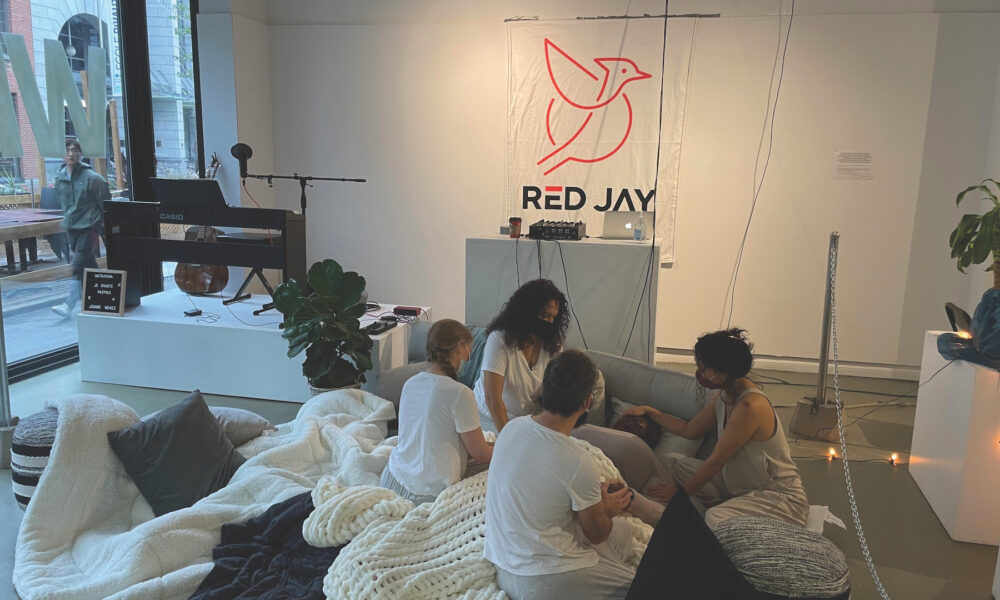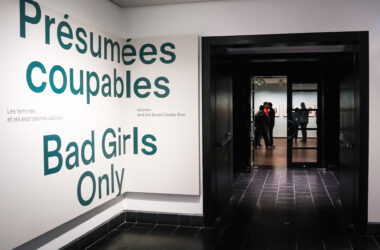After months of strict isolation and social distancing regulations, many are missing the comfort of a good hug. Self-proclaimed “Artivist” Red Jay, a.k.a. Joshua Oliver, has created a remedy for the loneliness the pandemic has fostered. On World Mental Health Day, October 10, Red Jay presented a two-part exhibit called the “Human Weighted Blanket,” which offered a professional platonic touch workshop both in person and online.
Red Jay was inspired by a viral tweet about two nurses’ ingenuity in an ICU ward in Brazil. To soothe COVID-19 patients whose illness made it impossible for loved ones’ physical comfort, nurses filled gloves with warm water to simulate human touch, calling it “the hand of God.” Jay also drew inspiration from the 1950s “happenings” movement, which implicated viewers in performative and situational art forms. These acts of creative kindness led him to create his own performance piece to highlight—and help ease—mental health struggles. By gathering a group of professional touch therapists, Red Jay hosted a space for people craving human touch.
One half of the exhibit is a short video, which Jay calls a “virtual hug.” The film depicts three participants affected by anxiety, depression, and complex post-traumatic stress disorder who are invited to test a “special” weighted blanket. Unbeknownst to them, the “blanket” is a session with four professional touch therapists who specialize in somatic bodywork, massage, and cuddling—quite literally a “Human Weighted Blanket.” From there, they calm the participants through a combination of group meditation and massage therapy. Although each participant’s time with the touch therapists is short, the participants visibly relax. One participant, named Bella, described how their struggles with gender dysphoria caused them to associate their body with pain. However, after their experience with the “Human Weighted Blanket,” Bella realized their potential to heal and associate positivity with their body.
The exhibit’s other half sees participants—chosen at random from consenting bystanders at the exhibit—and viewers get to see the therapists and the “Human Weighted Blanket” in action. Each participant starts their session by talking with the therapists. The professionals ask how they can be helpful and also give a quick overview of the types of therapies they offer. The participants lead the session, deciding their positions, setting boundaries, and communicating with the professionals throughout the entire process.
“The way to make a cuddle good is by expressing what it is that [the participant] desire[s], but the most important thing is establishing communication and trust,” professional touch therapist Sharon Lopez said in an interview with The McGill Tribune.
Given that the experience is a collaboration between the experts and participants, the therapists adapt to the person’s needs and comforts. By constantly checking in with their participant, the therapists can maintain consistent consent, making it a positive experience for both parties.
Although the idea of being cuddled by strangers may seem odd, participants find comfort and peace in the trusting warmth of the “Human Weighted Blanket.” At a time when human interaction is scarce, Red Jay celebrates the healing potential of physical platonic touch that was taken away during the pandemic.
After months of strict isolation and social distancing regulations, many are missing the comfort of a good hug. Self-proclaimed “Artivist” Red Jay, a.k.a. Joshua Oliver, has created a remedy for the loneliness the pandemic has fostered. On World Mental Health Day, October 10, Red Jay presented a two-part exhibit called the “Human Weighted Blanket,” which offered a professional platonic touch workshop both in person and online.
Red Jay was inspired by a viral tweet depicting two nurses’ ingenuity in an ICU ward in Brazil. To soothe COVID-19 patients whose illness made it impossible for loved ones’ physical comfort, nurses filled gloves with warm water to simulate human touch, calling it “the hand of God.” Jay also drew inspiration from the 1950s “happenings” movement, which implicated viewers performative and situational art forms. These acts of creative kindness led him to create his own performance piece to highlight—and help ease— mental health issues. By gathering a group of professional touch therapists, Red Jay created a space that gives “hands of God” to non-COVID affected people who are craving human touch.
One half of the exhibit is a short video, which Jay calls a ‘virtual hug.’ The film depicts three participants affected by anxiety, depression, and complex post-traumatic stress disorder who are invited to test a ‘special’ weighted blanket. Unbeknownst to them, the ‘blanket’ refers to four professional touch therapists who specialize in somatic bodywork, massage, and cuddling. From there, they calm the participant through a combination of group meditation and massage therapy. Although each participant’s time with the ‘blanket’ is short, the participants visibly relax. One participant, named Bella, described how their struggles with body dysphoria caused them to associate their body with pain. However, after their experience with the ‘Human Weighted Blanket,’ Bella realized their potential for healing and associating positivity with their body.
The exhibit’s other half is the actual ‘Human Weighted Blanket,’ where participants—chosen at random from consenting bystanders at the exhibit—and viewers get to see the therapists in action. Each participant starts their session by talking with the therapists. The professionals ask how they can be helpful and also give a quick overview of the types of therapies they offer. The participants lead the session, deciding their positions, setting boundaries, and communicating with the professionals throughout the entire process.
“The way to make a cuddle good is by expressing what it is that [the participant] desire[s], but the most important thing is establishing communication and trust,” professional touch therapist Sharon Lopez said in an interview with The McGill Tribune.
Given that the experience is a collaboration between the experts and participants, the therapists adapt to the person’s needs and comforts. By constantly checking in with their participant, the therapists can maintain consistent consent, making it a positive experience for both parties.
Although the idea of being cuddled by strangers may seem odd, participants find comfort and peace in the trusting warmth of the ‘Human Weighted Blanket.’ At a time when human interaction is scarce, Red Jay celebrates the healing potential of physical platonic touch that was taken away during the pandemic.









As someone who has practiced Platonic Touch Therapy since 2016, I can attest to people’s need to be seen, heard, and touched in a safe and non-judgmental space. In my experience, there is usually some apprehension for first-timers, but that typically subsides once they relax and are ready to receive. If you haven’t tried it and you’re feeling lonely, stressed, anxious, depressed, or grieving, give it a shot. You might realize you were missing touch in your life. Happy Hugging!